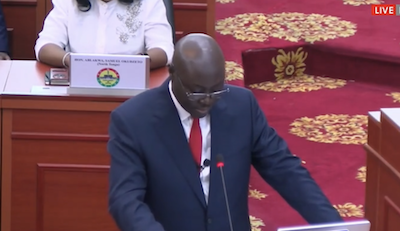In a highly anticipated address to Parliament on November 13, 2025, Ghana’s Finance Minister, Dr. Cassiel Ato Forson, unveiled the 2026 Budget Statement and Economic Policy on behalf of President John Dramani Mahama.
The presentation, livestreamed across major media outlets, commenced amid somber tones as Dr. Forson extended condolences to families affected by the recent tragic stampede at the Ghana Armed Forces enlistment exercise. Drawing from Article 179 of the Constitution, the session underscored the government’s commitment to transparency and stakeholder engagement, including recent consultations with market traders in Takoradi.
Ghana’s Finance Minister Ato Forson Presents Ambitious 2026 Budget
The budget’s overarching theme, “Resetting for Growth, Jobs, and Economic Transformation,” signals a bold shift toward renewal after inheriting an economy burdened by massive debts and instability. Dr. Forson emphasized that the administration has restored fiscal discipline, tamed inflation, and stabilized the cedi, fostering renewed investor confidence and positioning Ghana to “produce more than it consumes.” He hailed organized labor for their pivotal role in these gains, vowing no shortcuts in pursuing responsible economic stewardship.
Central to the blueprint are aggressive job creation measures, with targeted investments in the “Big Push” industrial drive and the “24-Hour Economy” initiative to unlock round-the-clock productivity in agriculture, manufacturing, and services. Sectoral allocations prioritize infrastructure, education, and healthcare, aiming to generate over 500,000 new jobs while advancing digital economy hubs and youth entrepreneurship programs. Tax reforms feature a reviewed VAT structure to ease burdens on low-income earners, alongside incentives for green energy transitions.
On the fiscal front, the budget projects a modest deficit reduction through revenue mobilization and expenditure rationalization, with commitments to debt restructuring and enhanced social safety nets. Dr. Forson highlighted ongoing market interventions, including an $8 billion stabilization package, to sustain cedi appreciation and curb import dependencies. Critics from the opposition noted potential risks in fiscal space constraints, but the minister countered with data-driven optimism for a 6% GDP growth trajectory.
As the Black Star rises anew, this 2026 fiscal roadmap positions Ghana for inclusive prosperity, blending reform with resilience. Stakeholders anticipate parliamentary debates to refine these proposals, with implementation eyed as a litmus test for the administration’s transformative vision.



